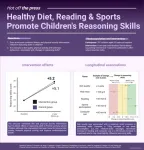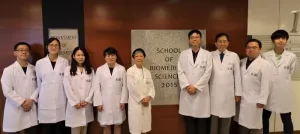(Press-News.org) Bias in the collection of data on which Artificial Intelligence (AI) computer programmes depend can limit the usefulness of this rapidly growing tool for climate scientists predicting future scenarios and guiding global action, according to a new paper by researchers at the University of Cambridge published in Nature’s npj |Climate Action series.
AI computer programmes used for climate science are trained to trawl through complex datasets looking for patterns and insightful information. However, missing information from certain locations on the planet, time periods or societal dynamics create “holes” in the data that can lead to unreliable climate predictions and misleading conclusions.
Primary author and Cambridge Zero Fellow Dr Ramit Debnath said that individuals with access to technology, such as scientists, teachers, professionals and businesses in the Global North are more likely to see their climate priorities and perceptions reflected in the digital information widely available for AI use.
By contrast, those without the same access to technology, such as indigenous communities in the Global South, are more likely to find their experiences, perceptions and priorities missing from those same digital sources.
Debnath said: “When the information on climate change is over-represented by the work of well-educated individuals at high-ranking institutions within the Global North, AI will only see climate change and climate solutions through their eyes.”
“Biased” AI has the potential to misrepresent climate information.
For example, it could generate ineffective weather predictions or underestimate carbon emissions from certain industries, which could then misguide governments trying to create policy and regulations aimed at mitigating or adapting to climate change.
AI-supported climate solutions which spring from biased data are in danger of harming under-represented communities, particularly those in the Global South with scant resources. These are often the same communities who also find themselves most vulnerable to the extreme weather events caused by climate change such as floods, fires, heatwaves and drought.
That is a combination which could lead to “societal tipping events”, the paper warns.
However, these “data holes” can be filled by human knowledge. The authors advocate for a human-in-the loop design to offer AI climate change programmes with a sense check on which data is used and the context in which it is used, in an effort to improve the accuracy of predictions and the usefulness of any conclusions.
The authors mention popular AI chatbot model ChatGPT, which has recently taken the world by storm for its ability to communicate conversationally with human users. On ChatGPT, the AI can ask its human users follow-up questions, admit mistakes, challenge incorrect premises and reject inappropriate requests.
This ‘human-in-the-loop’ style AI allows bias to be noticed and corrected, the authors said. Users can input critical social information, such as existing infrastructure and market systems, to allow the AI to better anticipate any unintended socio-political and economic consequences of climate action.
Co-author, Cambridge Zero Director and climate scientist Professor Emily Shuckburgh said: “No data is clean or without prejudice, and this is particularly problematic for AI which relies entirely on digital information.”
In highlighting the importance of globally inclusive datasets, the paper also promotes broadband internet access as a public necessity, rather than a private commodity, to engage as many users as possible in the design of AI for contemporary conversations about climate action.
The paper concludes that human-guided technology remains instrumental in the development of socially responsible AI.
Less-biased AI will be critical to our understanding of how the climate is changing, and consequently in guiding realistic solutions to mitigate and adapt to the on-going climate crisis, the authors said.
Professor Shuckburgh, who also leads the UK national research funding body’s (UKRI) Centre for Doctoral Training on the Application of AI to the study of Environmental Risks (AI4ER), said: “Only with an active awareness of this data injustice can we begin to tackle it, and consequently, to build better and more trustworthy AI-led climate solutions.”
END
Is data justice the key to climate justice?
Biased artificial intelligence needs human help to avoid harmful climate action, Cambridge researchers said
2023-08-17
ELSE PRESS RELEASES FROM THIS DATE:
AI model developed by Brigham researchers could help screen for heart defect
2023-08-17
The AI model was more efficient at detecting signatures of atrial septal defect (ASD) in electrocardiograms (ECG) than traditional methods.
Investigators from Brigham and Women’s Hospital, a founding member of the Mass General Brigham healthcare system, and Keio University in Japan have developed a deep learning artificial intelligence model to screen electrocardiogram (ECG) for signs of atrial septal defects (ASD). This condition can cause heart failure and is underreported due to a lack of symptoms before irreversible complications arise. Their results are published in eClinicalMedicine.
"If we can deploy our model on a population-level ECG screening, ...
Child Development Journal Q&A: How do youth view gang violence is shaping their communities?
2023-08-17
How do children and adolescents evaluate and reason about acts of physical violence in the context of chronic violence that impacts their communities? Previous studies have used situations that correspond with a single act of interpersonal harm void of broader conditions of violence shaping the context in question. A new study released in Child Development examined how youth exposed to gangs known as maras (e.g., MS 13) in Honduras morally deliberate about conditions of gang violence compared with youth not exposed to gangs in Nicaragua, where there are very few maras ...
Can children recognize sick faces?
2023-08-17
According to the World Health Organization, globally, infectious disease is a leading cause of death among children. Furthermore, children are more likely than adults to contract infectious illnesses. However, there’s a gap in research measuring children’s responses to sick faces. It is important to understand how children’s ability to recognize and avoid sickness emerges and develops to help improve children’s health and public health more broadly. Previous research has only reported that adults can use faces to recognize if someone is sick and make judgments about whether to approach or avoid them.
Researchers from the University ...
Lorazepam treatment may be linked to worse outcomes for pancreatic cancer patients
2023-08-17
PHILADELPHIA – Patients with pancreatic cancer who took the benzodiazepine lorazepam (Ativan), commonly prescribed to treat anxiety during cancer treatment, had a shorter progression-free survival than patients who did not, according to results published in Clinical Cancer Research, a journal of the American Association for Cancer Research (AACR).
In contrast, patients who took the benzodiazepine alprazolam (Xanax) had a significantly longer progression-free survival than patients who did not.
Benzodiazepines are a class of drugs that suppress the activity of the central nervous system, which can relieve ...
A healthy diet, reading, and doing sports promote reasoning skills in children
2023-08-17
Reasoning skills are crucial skills in learning, academic performance, and everyday problem-solving. According to a recent study conducted at the University of Eastern Finland, improved overall diet quality and reduced consumption of red meat, as well as increased time spent in reading and organised sports enhanced reasoning skills among children over the first two school years.
“Children with healthier eating habits showed greater cognitive development than other children. Specifically, better overall diet quality, ...
Heredity and environment account for people’s love of nature
2023-08-17
Humans have a positive view of nature. But is this due to an approach we have learned while growing up, or is it something we are born with? The answer is ‘Both’, according to researchers at the University of Gothenburg and the Swedish University of Agricultural Sciences.
Our love of nature is highly individual and should influence how we plan our cities, say the researchers.
It is well known that nature has a positive effect on people. In cities in particular, studies have shown that trees and other greenery contribute to people’s wellbeing. However, experts do not agree on the reasons behind this phenomenon, known ...
Are you breaking your body clock?
2023-08-17
Researchers are using mathematical models to better understand the effects of disruptions like daylight savings time, working night shifts, jet lag or even late-night phone scrolling on the body’s circadian rhythms.
The University of Waterloo and the University of Oxford researchers have developed a new model to help scientists better understand the resilience of the brain’s master clock: the cluster of neurons in the brain that coordinates the body’s other internal rhythms. They also hope to suggest ...
HKUMed & CityU researchers jointly generate human neural stem cells with powerful therapeutic potential for the treatment of spinal cord injury, paving the way for new therapeutic opportunities
2023-08-17
A joint research team from LKS Faculty of Medicine, the University of Hong Kong (HKUMed) and City University of Hong Kong (CityU) has generated human neural stem cells with powerful therapeutic potential for the treatment of spinal cord injury that paves the way for new therapeutic opportunities. The new findings are now published in the leading multidisciplinary science journal, Advanced Science [link to publication].
Background
Traumatic spinal cord injury (SCI) commonly caused by a car accident, fall, or sport-related accident results in the progressive loss of neurons involved in motor and sensory functions at and around ...
Nauseous territory: outfoxing predators using baits that make them barf
2023-08-17
Introduced foxes, dogs, cats, rats, and other predators kill millions of native animals every year, but what if they were conditioned to associate this prey with food that made them ill?
A team of international researchers have shown the potential to do just that, burying baits containing capsules of levamisole, a chemical that induces nausea and vomiting when consumed by predators.
In a world first experiment conducted in south-eastern Australia, where introduced red foxes are responsible for countless wildlife deaths, the Australian National University (ANU) and University of South Australia scientists laid baits of fried deboned chicken, with some containing ...
Accelerating discovery in artificial intelligence for science
2023-08-17
What if artificial intelligence (AI) could be used to spur discovery in areas such as biotechnology, drug discovery and fluid dynamics? Using geometric graphs and innovative methodologies, AI can solve fundamental problems in basic natural science. The possibilities are endless in this relatively new field known as AI for science.
Dr. Shuiwang Ji, a professor in the Department of Computer Science and Engineering at Texas A&M University, recently received a National Science Foundation grant to ...
LAST 30 PRESS RELEASES:
Novel camel antimicrobial peptides show promise against drug-resistant bacteria
Scientists discover why we know when to stop scratching an itch
A hidden reason inner ear cells die – and what it means for preventing hearing loss
Researchers discover how tuberculosis bacteria use a “stealth” mechanism to evade the immune system
New microscopy technique lets scientists see cells in unprecedented detail and color
Sometimes less is more: Scientists rethink how to pack medicine into tiny delivery capsules
Scientists build low-cost microscope to study living cells in zero gravity
The Biophysical Journal names Denis V. Titov the 2025 Paper of the Year-Early Career Investigator awardee
Scientists show how your body senses cold—and why menthol feels cool
Scientists deliver new molecule for getting DNA into cells
Study reveals insights about brain regions linked to OCD, informing potential treatments
Does ocean saltiness influence El Niño?
2026 Young Investigators: ONR celebrates new talent tackling warfighter challenges
Genetics help explain who gets the ‘telltale tingle’ from music, art and literature
Many Americans misunderstand medical aid in dying laws
Researchers publish landmark infectious disease study in ‘Science’
New NSF award supports innovative role-playing game approach to strengthening research security in academia
Kumar named to ACMA Emerging Leaders Program for 2026
AI language models could transform aquatic environmental risk assessment
New isotope tools reveal hidden pathways reshaping the global nitrogen cycle
Study reveals how antibiotic structure controls removal from water using biochar
Why chronic pain lasts longer in women: Immune cells offer clues
Toxic exposure creates epigenetic disease risk over 20 generations
More time spent on social media linked to steroid use intentions among boys and men
New study suggests a “kick it while it’s down” approach to cancer treatment could improve cure rates
Milken Institute, Ann Theodore Foundation launch new grant to support clinical trial for potential sarcoidosis treatment
New strategies boost effectiveness of CAR-NK therapy against cancer
Study: Adolescent cannabis use linked to doubling risk of psychotic and bipolar disorders
Invisible harms: drug-related deaths spike after hurricanes and tropical storms
Adolescent cannabis use and risk of psychotic, bipolar, depressive, and anxiety disorders
[Press-News.org] Is data justice the key to climate justice?Biased artificial intelligence needs human help to avoid harmful climate action, Cambridge researchers said



